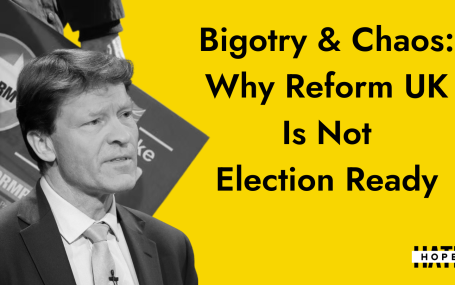HOPE not hate uses cookies to collect information and give you a more personalised experience on our site. You can find more information in our privacy policy. To agree to this, please click accept.
For several months HOPE not hate has been running a campaign across the capital to engage Londoners in the local elections.
In our target boroughs of Bromley, Barnet, Harrow and Kingston, we’ve driven active citizenship workshops, high-visibility voter registration drives and organised voter turnout days of action.

During our 10 – 17 April Democracy Week, we managed to directly engage over 3,000 people in voter registration drives across colleges, universities and community centres.
And this week we’ve reached almost 10,000 target households with our turnout cards, which included pledges from local candidates to key issues our supporters, local residents and community groups told us they cared about.
We faced some hurdles – government bodies putting in minimum resources to raise awareness, the Easter break taking place just before the voter registration deadline, and many EU nationals not knowing they were allowed to vote – but one major hurdle that deserves more attention was the photo voter ID trial in Bromley.
The requirement to show photo ID before being allowed to vote stopped some people from casting a vote – a vote they were entitled to. It’s as simple as that. And it is unacceptable.
We were on ground, in Bromley, from early morning when reports started coming in from our supporters that some voters were being turned away because they hadn’t known they would be asked to show ID. Others were refusing to vote out of principle.

None of the reminders that the Council claimed they’d put out had reached these people, especially those who lived in flats on council estates. Some people were put off by the long queues (exacerbated by low staffing levels) and the time it took to do checks.
By the afternoon the national media was taking note of the anger and the confusion that voters, especially in Bromley, were eager to put on the record.
While it might theoretically be possible to pretend to be someone else in order to vote, it almost never happens.
Figures from the Electoral Commission show there were just 28 allegations of impersonation last year out of nearly 45 million votes in 2017 – that is 0.000063%, or one case for every 1.6 million votes cast. Only one of these allegations resulted in a conviction.
Photo voter ID trials were trying to solve an issue that does not exist, but there was a real, documented risk that it will deny those most in need of a voice.
Warnings from the Equality and Human Rights Commission and over 40 leading NGOs and academics that the trial would have “a disproportionate impact on older people, BME communities, trans people, and disabled people” fell on deaf ears.
The fact that known “radicals” and “trouble makers” like Age UK, the Salvation Army and Stonewall took a stand speaks for itself.

Yesterday, a spokesman for the Prime Minister, asked about reports of some voters being turned away, told The Guardian: “The overwhelming number of people are casting their vote without a problem.”
And here lies the problem. In the 2011 Census, 9.5 million people stated they did not hold a passport, 9 million do not have a driving licence and in 2013/14 1.7 million lacked even a bank account.
That makes mandatory voter ID a barrier to many people exercising their right to vote.
In a country like ours that does not have a free provision for a national ID, where we’ve just recently found out that the state has destroyed the documentation of some of its citizens from the Windrush generation, creating the environment that will deny the right to vote and effectively silence even one single person is a scandal.
The evidence is out there already. Research in the US has found that voter ID laws might have prevented up to 31 cases of voter fraud out of a billion votes cast between 2000 and 2014.
But at the same time, the Brennan Center at New York University estimated that 11% of eligible voters in the US lack the kind of photo ID that are generally required by these laws, and “they are disproportionately Black, Latino, low income, students and elderly voters” and tend to vote for the Democrats.

No wonder it is Republicans who have pushed these voter ID laws.
As Darren Hughes, chief executive of the ERS, said:
“It’s hard not to see this as a calculated effort by the Government to make voting harder for some citizens. With millions of people lacking the right photographic ID – and no government plans for a universal, free alternative – this can only mean another barrier for honest voters. The Government know this, which makes this policy all the more concerning.”
One thing is clear for those of us working in communities across the country to ensure democracy works for everyone – we need to engage more people in the democratic process and to modernise our electoral system, not to put up further barriers.
British democracy needs safeguarding and modernising now more than ever:
Increased democratic engagement and civic participation are pillars of integration and a cohesive society and must be championed.

HOPE not hate reveals ANOTHER shameful Reform UK candidate – and lifts the lid on the party’s chaotic selection process UPDATE: Reform UK has DROPPED…